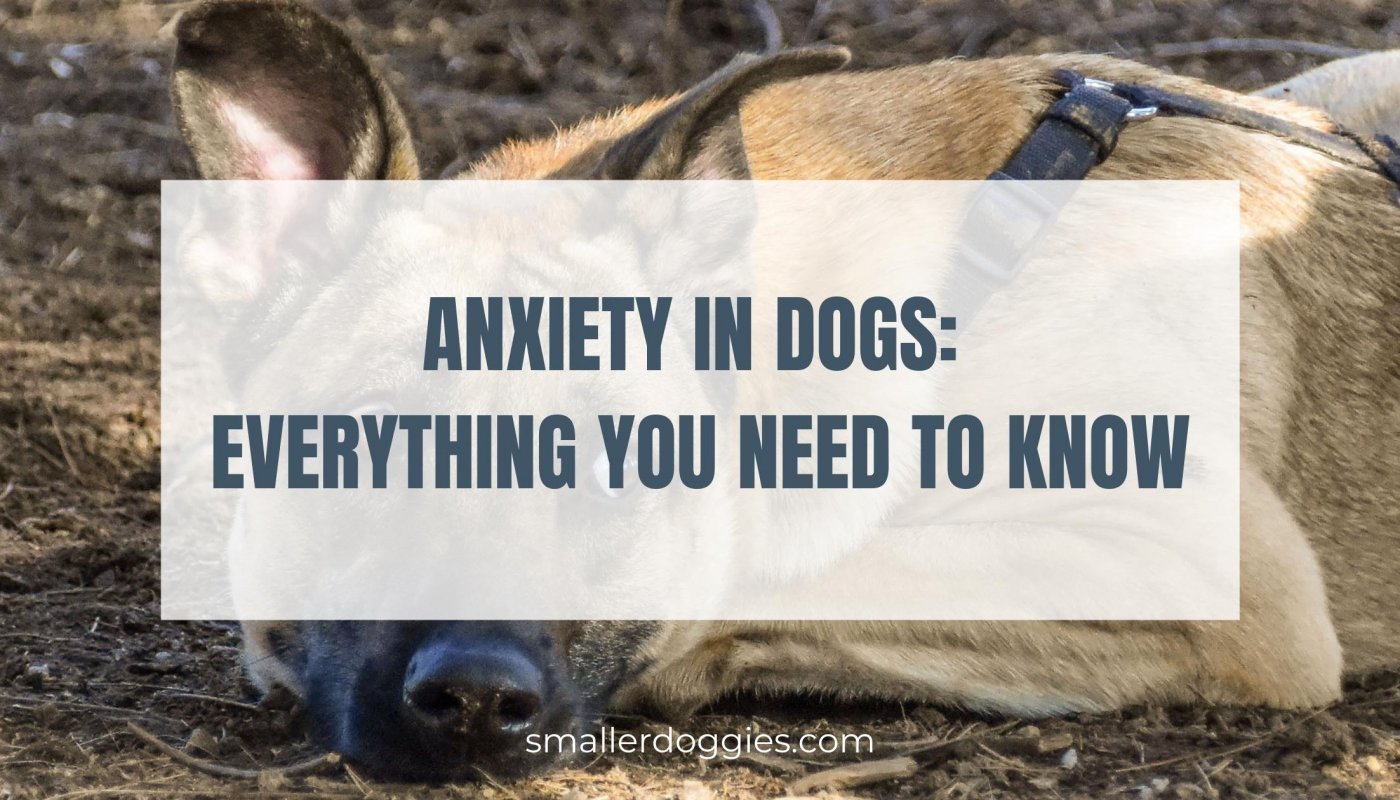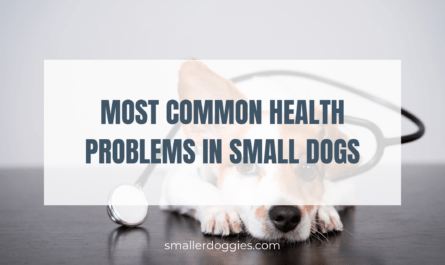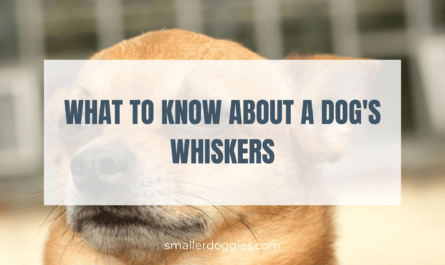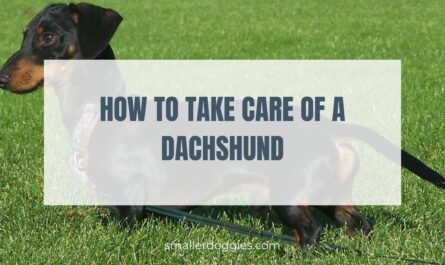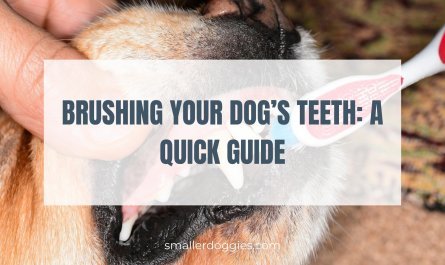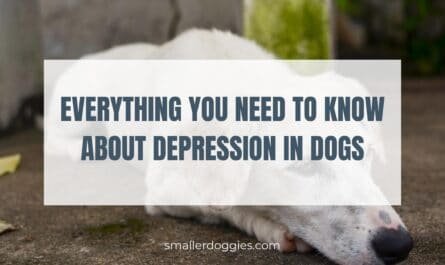Post Disclaimer
This post may contain affiliate links. If you use these links to buy something we earn a commission at no extra cost to you. Smaller Doggies is supported by its audience, Thank you!
According to a study, more than 70% of dogs were reported to be going through some kind of anxiety.
These numbers indicate anxiety is pretty common in dogs, and most dog owners unknowingly miss these signs.
Dogs have feelings just like humans. They feel sadness when they are separated from their owners. If they are treated harshly, it takes a toll on their personality. On the other hand, there might be some stimuli that can trigger anxiety in dogs.
In this article, take a look at everything related to anxiety in dogs and how you can tell if your dog has anxiety.
Table of Contents
- Types of Anxiety in Dogs
- Dog Anxiety Symptoms
- What Causes Anxiety in Dogs?
- Anxiety in Dogs: Treatment and Tips
- How to Prevent Anxiety in Dogs?
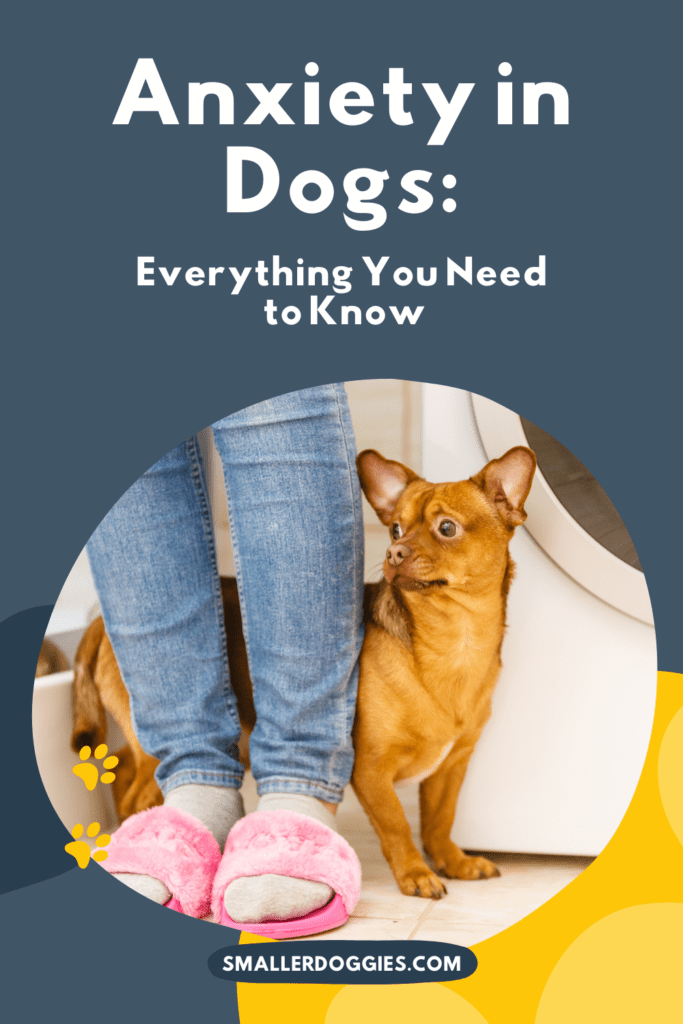
Types of Anxiety in Dogs
Here are some of the types of anxieties dogs suffer in general:
Separation Anxiety
Dogs with separation anxiety tend to get all over the house when the owner leaves or prepares to leave the house.
While all dogs are attached to their humans, dogs with separation anxiety show signs of distress when they feel they will be separated from their owners. In severe separation anxiety in dogs, you may see more destructive behavior such as excessive drooling, or urinating to name a few.
This impulsive ‘please don’t go’ behavior hinders their personal development and individualism.
Rescue or Shelter Anxiety
Some dogs do not have a very pleasant past. Before getting adopted or rescued into shelters, they faced harsh street life. Dogs that have just been adopted show this kind of anxiety. It takes time and a lot of love for them to break into their new house.
Anxiety due to illness
Older dogs can develop anxiety because of some pain due to medical reasons. These dogs can also get forgetful(dementia) like old-aged humans get Alzheimer’s. They can get restless, or their sleeping schedule might be disturbed. All of this contributes to anxiety in older dogs.
Fear-Stimulated or Environmental Anxiety
Some environmental factors can trigger anxiety in dogs, such as a loud noise, a specific place, or a creature(other dogs or humans). Dogs can get stressed out when they realize they have been brought to the vet. Some dogs even fear going out of the house.
With that said, well-trained dogs can also show signs of anxiety without any explanation or anxiety triggers.

Dog Anxiety Symptoms
You can tell if your dog has anxiety by observing his body language and behavior. Here are some red flags you should look out for:
- Continuous barking
- Destructive behavior
- Urinating or defecation in places where they shouldn’t
- Aggression towards other dogs or humans
- Loss of appetite
- Excessive drooling
- Pacing around the house
What Causes Anxiety in Dogs?
Dogs can develop anxiety about virtually anything. Here are the most common causes of anxiety in dogs:
- Traveling anxiety
- Visiting places such as the vet clinic or someone else’s home
- Contact with other dogs or humans
- The dog has been abused in the past
- Long-term or short term separation from the owner
- Loud or sharp noises like sirens
- CDS (cognitive dysfunction syndrome) in older dogs
Anxiety in Dogs: Treatment and Tips
Is your dog showing signs of anxiety? Here are some tips to get you started:
Consult Your Vet
Your vet will help you pinpoint the causes of anxiety in dogs and take the necessary measures. If it is something serious, they might prescribe some anti-stress medication or natural therapy. For older dogs with canine cognitive dysfunction, the drug selegiline is often used.
Take it Slow
Treating anxiety in dogs should not be rushed. Dogs should be allowed to adapt to their new environment. Dog owners should make use of treats, positive encouragement, and bonding. It is a gradual process that requires a lot of patience on behalf of the dog owner.
Use Desensitization or Counter-conditioning Method
Another way to tackle anxiety in dogs is by making them comfortable around the triggers and slowly desensitizing them.
If your dog is scared of traveling or the vet’s clinic, try to make the whole experience fun and enjoyable for them. Make him realize that there is nothing to be afraid of by being vocal and giving him treats. This method can prove to be a strong tool to help your dog overcome his fears.
How to Prevent Anxiety in Dogs?
Anxiety in dogs can build up slowly, and there are chances that you might be missing the signs. Looking to keep your pawfect companion safe and healthy?
Here are some tips to prevent anxiety in dogs:
Look for the Signs
We have mentioned the signs and red flags of distress in dogs in this article. You should keep a vigilant eye on your dog’s behavior and see if he is acting differently. Detecting these signs in the early stages makes a world of difference.
Training
A well-trained dog knows how to interact with its owners and other people. If you are new to the doggo universe, you should consider getting professional training assistance.
You can teach basic commands to your dog quite easily, but a good dog trainer will help desensitize your dog. You should prioritize joining these training sessions as it will strengthen the bond with your dog.
Socialization is Key
Socialization is great for the mental stimulation of your dog. Meeting other dogs and humans will help him be comfortable around others. The best way to do it is by taking your dog for a walk to the park. This will get the blood flowing and release any negative energy.
Proper Diet and Exercise
Your dog is what he eats. Dogs stop eating when they are stressed out, and it affects their health. Give your dog a wholesome and nutritious diet. Small dog breeds have high energy levels, so you need to give them half an hour of exercise.
Soothing Sounds
According to a study published in the Journal of Veterinary Behaviour, classical music help dogs calm down. So, the next time your dog gets stressed out, play him a Bob Marley song, and you will be good to go.
Final Thoughts
Your dog becomes a part of you from the moment you adopt him. But keeping a dog comes with its challenges as well.
The most powerful tool to fight anxiety in dogs is the constant interaction with his human. We hope that our detailed guide on anxiety in dogs was informative and fun.
What are your views on this? Share in the comments bar below.

